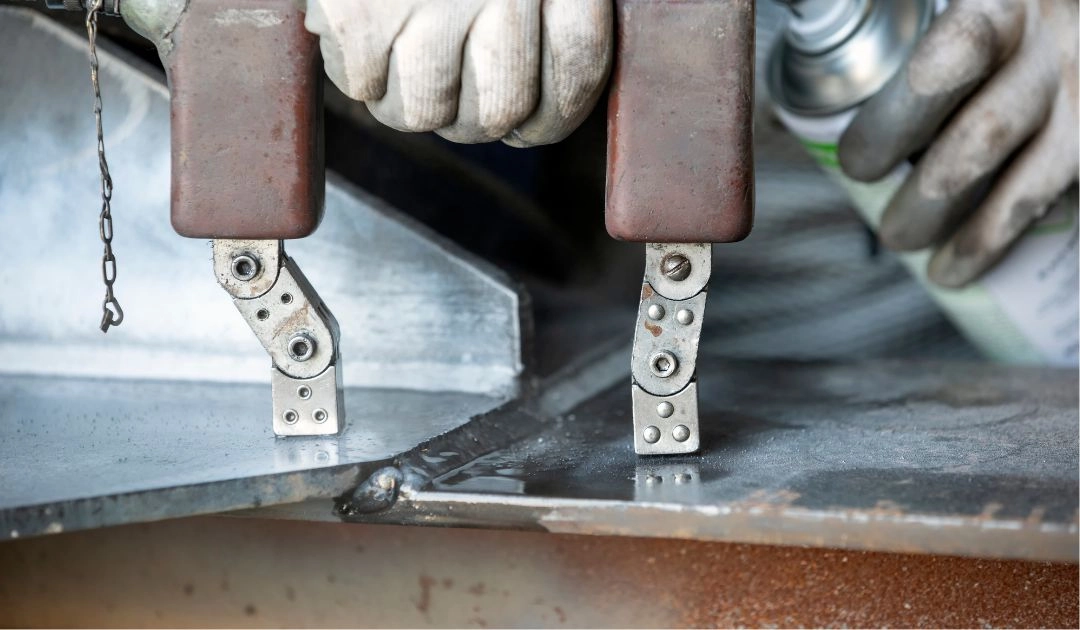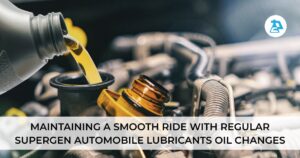Introduction
In the realm of non-destructive testing (NDT), Magnetic Particle Testing (MPI) stands out as a reliable and widely-used method for detecting surface and near-surface flaws in ferromagnetic materials. The success of this technique hinges on the proper utilization of MPI oils, which play a pivotal role in enhancing the sensitivity and accuracy of flaw detection. In this blog, we delve into the key properties and formulations of MPI oils, shedding light on their essential role in achieving effective magnetic particle testing.
What are MPI Oils?
MPI oils, or magnetic particle inspection oils, are specialized liquids used in Magnetic Particle Testing (MPI). They create stable suspensions of ferromagnetic particles in a carrier fluid, enhancing flaw visibility in ferromagnetic materials. These oils are crucial for detecting surface and near-surface flaws in various industries, ensuring safety and structural integrity.
The main purpose of MPI oils is to produce a stable suspension of ferromagnetic particles in a carrier fluid, often made of iron or iron oxide. These particles collect and generate clear signs at the sites of flaws, fissures, and other discontinuities when a magnetic field is applied to the test material. These signs, often referred to as “magnetic particle indications,” are essential for spotting possible defects in the substance.
Properties of MPI Oil for Magnetic Particle Testing:
MPI oils play a pivotal role in Magnetic Particle Testing by creating a stable and sensitive suspension of ferromagnetic particles.Its properties significantly impact flaw detection efficiency. By understanding and selecting MPI oils with the appropriate properties, technicians and inspectors can ensure more effective and accurate testing, contributing to improved safety and quality assurance in various industries.
- Ferromagnetic Particle Suspension:
The main purpose of MPI oils is to get ferromagnetic particles into a stable suspension. When a magnetic field is used during testing, these particles are drawn to and collected at the areas of surface or near-surface flaws. The sensitivity and accuracy of fault identification are directly impacted by the nature and consistency of the particle suspension.
- Particle Size and Distribution:
Effective testing depends on the size of the ferromagnetic particles used in MPI oils. Larger particles are more suited for identifying larger or deeper errors, while smaller particles increase sensitivity to finer imperfections. Additionally, uniform particle distribution guarantees consistent outcomes and even coverage across the test area.
- Carrier Fluid Characteristics:
The MPI oils’ carrier fluid serves as a vehicle for dispersing the ferromagnetic particles. For a smooth application and even particle dispersion, the fluid’s qualities, such as viscosity, volatility, and wetting ability, are essential. A low-viscosity fluid makes application simpler, and appropriate wetting guarantees that particles stick to the surface effectively.
- Suspension Stability:
Throughout the testing process, MPI oils must retain suspension stability. In order to provide uniform particle distribution and accurate fault detection, stable suspensions avoid particle settling or agglomeration.
- Evaporation Rate:
The examination time frame is impacted by the carrier fluid’s evaporation rate. Slower evaporation permits longer testing times while faster evaporation can result in particle clumping and decreased sensitivity.
- Sensitivity Variants:
Sensitivity Variants: Low and high sensitivity MPI oils are offered. Low sensitivity oils are appropriate for general fault identification and offer consistent outcomes in the majority of applications. High sensitivity oils are made to find incredibly minute flaws, making them perfect for testing materials that must meet exacting standards or for vital applications.
- Residue-Free:
After inspection, effective MPI oils should leave little to no residue on the surface that was put to the test. When testing fragile or sensitive materials, residue-free oils help to produce cleaner, more trustworthy test results.
- Compatibility:
To ensure adaptability and applicability across many sectors and testing settings, MPI oils should be compatible with a broad range of materials and surfaces.
Formulations of MPI Oils:
MPI oils, also known as magnetic particle suspensions, are carefully formulated to optimize flaw detection during Magnetic Particle Testing (MPI). These formulations involve selecting specific components to create a stable suspension of ferromagnetic particles in a carrier fluid. Several key formulations are commonly used, each offering unique advantages and suitability for different testing scenarios. Here are some common formulations for MPI oils:
- Oil-Based MPI Oils:
Oil-based MPI oils are formulated using a petroleum-based carrier fluid. They offer excellent stability and extended inspection times due to their slower evaporation rate. Oil-based formulations are well-suited for outdoor inspections or situations requiring prolonged testing periods. Additionally, they provide better penetration into surface discontinuities, making them suitable for rough or uneven surfaces.
- Water-Based MPI Oils:
Water-based MPI oils use water as the carrier fluid. They are environmentally friendly, non-flammable, and easy to clean, making them a preferred choice for environmentally-conscious applications. Water-based formulations are quick-drying, which can be advantageous in certain scenarios where rapid inspection is required. However, their faster evaporation rate may necessitate reapplication during longer inspections.
- Oil-in-Water Emulsions:
Oil-in-water emulsions combine the advantages of both oil-based and water-based formulations. They consist of small oil droplets suspended in a water-based carrier fluid. This formulation offers enhanced stability, better particle coverage, and improved wetting properties. Oil-in-water emulsions are versatile and commonly used in various MPI applications.
- Dry Powder MPI Oils:
Dry powder MPI oils are a unique formulation where the carrier fluid is absent, and the magnetic particles are provided in a powdered form. Technicians mix the powder with water or oil to create a suspension immediately before testing. Dry powder MPI oils offer excellent shelf life and reduce the risk of carrier fluid evaporation during storage. They are particularly useful in situations where on-site mixing is more practical or when longer shelf life is required.
- Fluorescent and Non-Fluorescent MPI Oils:
MPI oils are available in fluorescent and non-fluorescent formulations. Fluorescent MPI oils contain fluorescent additives that emit visible light when subjected to ultraviolet (UV) light during inspection. This enhances defect visibility in low-light conditions, making them ideal for inspections conducted in dark or dimly lit environments. Non-fluorescent MPI oils are suitable for inspections under regular lighting conditions.
MPI oils come in various formulations, each tailored to specific inspection needs and environmental considerations. Whether oil-based, water-based, emulsions, dry powder, fluorescent, or non-fluorescent, the appropriate MPI oil formulation is chosen to ensure optimal flaw detection sensitivity, stability, and reliability during Magnetic Particle Testing. These formulations play a pivotal role in enhancing the overall effectiveness of MPI, contributing to safer and more accurate inspections in diverse industries.
Conclusion:
The appropriate selection and application of MPI oils are essential components of the important NDT technique known as magnetic particle testing. The formulation of these oils maximizes particle suspension, flaw visibility, and flaw dispersion for ferromagnetic materials, resulting in efficient and precise flaw detection. Technicians and inspectors can adjust their testing strategy to fulfill certain inspection needs by being aware of the essential characteristics and formulas of MPI oils. MPI oils continue to pave the way for safer and more dependable testing procedures across numerous sectors as technology develops and new formulations appear.






